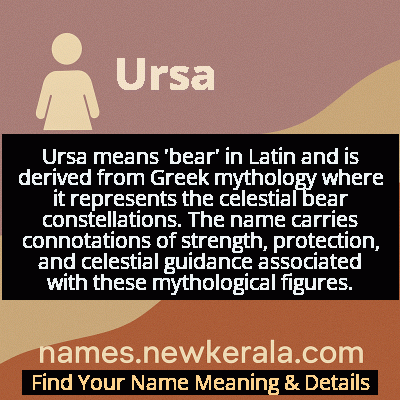Ursa Name Meaning & Details
Origin, Popularity, Numerology Analysis & Name Meaning of Ursa
Discover the origin, meaning, and cultural significance of the name URSA. Delve into its historical roots and explore the lasting impact it has had on communities and traditions.
Name
Ursa
Gender
Female
Origin
Greek
Lucky Number
5
Meaning of the Name - Ursa
Ursa means 'bear' in Latin and is derived from Greek mythology where it represents the celestial bear constellations. The name carries connotations of strength, protection, and celestial guidance associated with these mythological figures.
Ursa - Complete Numerology Analysis
Your Numerology Number
Based on Pythagorean Numerology System
Ruling Planet
Mercury
Positive Nature
Adventurous, dynamic, curious, and social.
Negative Traits
Restless, impatient, inconsistent, prone to indulgence.
Lucky Colours
Green, white.
Lucky Days
Wednesday.
Lucky Stones
Emerald.
Harmony Numbers
1, 3, 9.
Best Suited Professions
Sales, marketing, travel, entertainment.
What People Like About You
Versatility, charisma, adventurous spirit.
Famous People Named Ursa
Ursa Major
Mythological Figure
The celestial bear constellation representing Callisto transformed by Zeus
Ursa Minor
Mythological Figure
The smaller bear constellation representing Arcas or Cynosura in Greek mythology
Ursa Martinez
Contemporary Artist
Modern visual artist known for bear-themed installations and feminist art
Name Variations & International Equivalents
Click on blue names to explore their detailed meanings. Gray names with will be available soon.
Cultural & Historical Significance
The name embodies themes of transformation, maternal protection, and celestial guidance that have resonated across cultures from ancient Greek astronomy to Native American bear lore. In Roman culture, the bear was associated with the goddess Diana/Artemis and represented wild nature and feminine power. The enduring presence of the Ursa constellations in the northern sky has made the name synonymous with constancy and guidance, while the bear symbolism connects to strength, intuition, and protective motherhood across numerous indigenous traditions.
Extended Personality Analysis
Women named Ursa often exhibit strong, protective qualities reminiscent of the maternal bear archetype. They tend to be fiercely loyal to family and friends, possessing an innate nurturing instinct combined with formidable strength when those they love are threatened. Their personality typically balances gentle compassion with powerful resilience, much like the bear that can be both nurturing mother and fearsome protector. This duality allows them to navigate complex emotional landscapes with both sensitivity and determination.
Ursas are often perceived as grounded, intuitive individuals who trust their instincts and maintain strong connections to nature and tradition. They frequently demonstrate independence and self-reliance while maintaining deep emotional bonds with their inner circle. This combination of strength and sensitivity makes them natural leaders who protect and guide others with wisdom and determination. Their celestial namesake adds a dimension of vision and guidance, often making them sought-after for advice and direction in challenging situations. The name seems to inspire a personality that is both practical and visionary, capable of both immediate action and long-term planning.
Modern Usage & Popularity
In contemporary times, Ursa remains a rare but meaningful choice, often selected by parents drawn to celestial themes, mythology, or nature-inspired names. While not ranking in most countries' top name lists, it has seen a slight resurgence among parents seeking unique names with strong mythological roots and feminist undertones. The name appeals particularly to astronomy enthusiasts, nature lovers, and those appreciating names that convey strength and independence. Its usage spans various cultures, though it remains most popular in English-speaking countries and regions with strong classical education traditions. Modern Ursas often appreciate their name's uniqueness and the powerful symbolism it carries, with many choosing to emphasize either the celestial or bear symbolism in their personal identities.
Symbolic & Spiritual Meanings
Symbolically, Ursa represents transformation, protection, and celestial guidance. The bear symbolism connects to strength, motherhood, and healing across numerous cultures, while the celestial aspect adds dimensions of navigation, destiny, and cosmic connection. As a name, it embodies the journey from earthly struggle to heavenly placement, mirroring Callisto's transformation from nymph to constellation. It symbolizes the protective mother who becomes a guiding light, the wild nature tempered by cosmic order, and the individual who maintains their essence through profound change. The name carries the paradox of being both grounded in earthly strength and elevated to celestial significance, representing the human capacity for transformation and enduring legacy that guides others through darkness.

